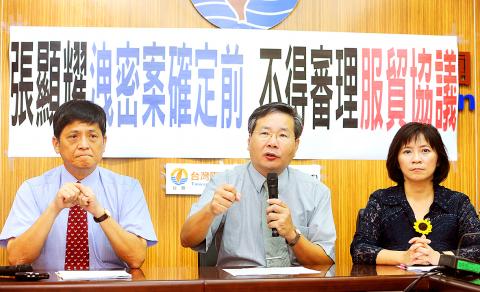The Taiwan Solidarity Union’s (TSU) legislative caucus yesterday said that the cross-strait service trade agreement should not be reviewed until the case in which former Mainland Affairs Council (MAC) deputy minister Chang Hsien-yao (張顯耀) is accused of leaking state secrets is closed.
Chang is accused of having spied for China during his time at the council and as vice chairman and secretary-general of the Straits Exchange Foundation, Taiwan’s semi-official negotiating body with China.
The Cabinet on Aug. 16 announced Chang’s resignation and initially said he left for “family reasons,” but later cited national security concerns.

Photo: Liao Chen-huei, Taipei Times
The Mainland Affairs Council later referred the matter to the Investigation Bureau, which is investigating the allegations against Chang, which it said could constitute treason.
Chang has maintained his innocence and has accused some in the government of fabricating accusations against him.
TSU caucus whip Lai Chen-chang (賴振昌) told a press conference yesterday that the council has so far failed to clarify the matter involving Chang and the accusations being traded by multiple “anonymous sources,” but has instead turned it into “a national security crisis” that started with the council’s “sneaky attempt to cover up [Chang’s ouster] by fabricating the excuse of him leaving for ‘family reasons.’”
“The Mainland Affairs Council, at this point, should not shun its responsibility to spell out all the cross-strait negotiations in which Chang has participated,” Lai said.
TSU Policy Committee Chairman Hsu Chung-hsin (許忠信) listed three major allegations that have been laid against Chang: “Influence peddling for Taiwanese businesspeople, divulging negotiation bottom lines and exercising power beyond the domain in which he had been authorized to act.”
“The latter two are extremely serious stuff,” he said, adding that Chang in his two-and-half-year stint as Mainland Affairs Council deputy minister had handled the signing of the Cross-Strait Bilateral Investment Protection and Promotion Agreement and the cross-strait service trade agreement.
“However, the MAC has been downplaying the possible repercussions, with MAC Minister Wang Yu-chi (王郁琦) claiming lightly that cross-strait negotiations would not be affected and Minister of Economic Affairs Woody Duh (杜紫軍) calling bottom lines ‘layered’ and asserting that Chang therefore might not have leaked the most confidential parts,” Hsu said.
Hsu said that what the nation’s representatives do during negotiations with foreign countries all involve national interests, “and once the bottom lines are disclosed, the agreement thereafter struck would not be in line with national interests.”
“If Chang did overreach his authority during the negotiations, the result of those negotiations, including the service trade pact, should be considered ineffective based on the legal notion of ultra vires,” Hsu added.
“Not only should the agreements not be handed over to the Executive Yuan for review, the Executive Yuan should not have referred them to the Legislative Yuan for deliberation either,” he said.
The TSU therefore “strongly demands” that all the reviews concerning the service trade pact, including the draft of cross-strait agreement oversight mechanism, be mothballed, at least until there has been a judgement made on Chang’s case, TSU Legislator Chou Ni-an (周倪安) said, calling on the government to also suspend all ongoing negotiations until the negotiation team has been reorganized.
Additional reporting by CNA

A Ministry of Foreign Affairs official yesterday said that a delegation that visited China for an APEC meeting did not receive any kind of treatment that downgraded Taiwan’s sovereignty. Department of International Organizations Director-General Jonathan Sun (孫儉元) said that he and a group of ministry officials visited Shenzhen, China, to attend the APEC Informal Senior Officials’ Meeting last month. The trip went “smoothly and safely” for all Taiwanese delegates, as the Chinese side arranged the trip in accordance with long-standing practices, Sun said at the ministry’s weekly briefing. The Taiwanese group did not encounter any political suppression, he said. Sun made the remarks when

The Taiwanese passport ranked 33rd in a global listing of passports by convenience this month, rising three places from last month’s ranking, but matching its position in January last year. The Henley Passport Index, an international ranking of passports by the number of designations its holder can travel to without a visa, showed that the Taiwan passport enables holders to travel to 139 countries and territories without a visa. Singapore’s passport was ranked the most powerful with visa-free access to 192 destinations out of 227, according to the index published on Tuesday by UK-based migration investment consultancy firm Henley and Partners. Japan’s and

BROAD AGREEMENT: The two are nearing a trade deal to reduce Taiwan’s tariff to 15% and a commitment for TSMC to build five more fabs, a ‘New York Times’ report said Taiwan and the US have reached a broad consensus on a trade deal, the Executive Yuan’s Office of Trade Negotiations said yesterday, after a report said that Washington is set to reduce Taiwan’s tariff rate to 15 percent. The New York Times on Monday reported that the two nations are nearing a trade deal to reduce Taiwan’s tariff rate to 15 percent and commit Taiwan Semiconductor Manufacturing Co (TSMC, 台積電) to building at least five more facilities in the US. “The agreement, which has been under negotiation for months, is being legally scrubbed and could be announced this month,” the paper said,

Japan and the Philippines yesterday signed a defense pact that would allow the tax-free provision of ammunition, fuel, food and other necessities when their forces stage joint training to boost deterrence against China’s growing aggression in the region and to bolster their preparation for natural disasters. Japan has faced increasing political, trade and security tensions with China, which was angered by Japanese Prime Minister Sanae Takaichi’s remark that a Chinese attack on Taiwan would be a survival-threatening situation for Japan, triggering a military response. Japan and the Philippines have also had separate territorial conflicts with Beijing in the East and South China